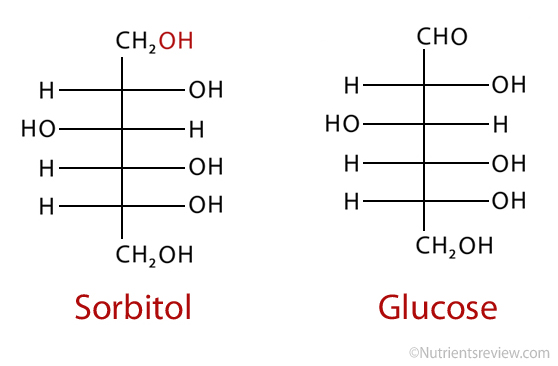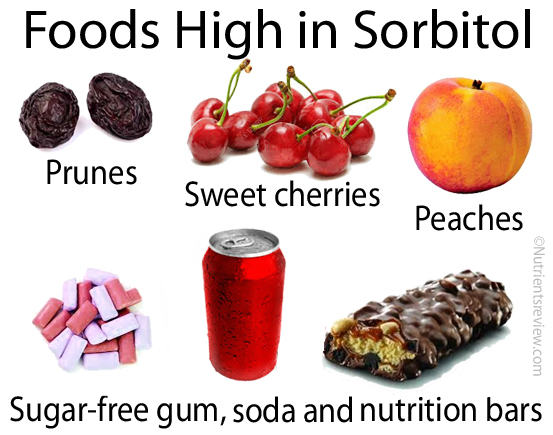- Mitchell, H., 2006, Sweeteners and Sugar Alternatives in Food Technology
- Sorbitol Calorie Control Council
- Current EU approved additives and their E Numbers Food Standards Agency
- Banares, F. et al, 2009, Fructose-sorbitol malabsorption PubMed
- Effects of an osmotically active agent on colonic transit Wiley Online Library
- Short-Chain Fatty Acid Production from Mono- and Disaccharides in a Fecal Incubation System: Implications for Colonic Fermentation of Dietary Fiber in Humans The Journal of Nutrition
- Ojetti, V. et al, 2009, Small bowel bacterial overgrowth and type 1 diabetes European Review for Medical and Pharmacological Sciences
- SCOGS (Select Committee on GRAS Substances) US Food and Drug Administration
- Sorbitol Food and Agriculture Organization of the United Nations
- Specifics of HFI and its diagnosis Boston University
- Pain National Cancer Institute
- Bauditz, J. et al, 2008, Severe weight loss caused by chewing gum PubMed Central
Sorbitol
What is sorbitol?
Sorbitol is a sugar alcohol, which is a poorly digestible carbohydrate that either naturally occurs in fruits or is semi-artificially produced and added as a low calorie sweetener to various commercial foods. Sorbitol is chemically similar to fructose and mannitol.
Other names for sorbitol: sorbit, glucitol.
Sorbitol Formula
Picture 1. Sorbitol structure compared to glucose
Nutrition Facts:
- Calories per gram = 2.6
- Glycemic index (GI) = 9
- Sweetness, relative to sucrose = 60%
- Net crabs = zero
Foods High in Sorbitol
- Sorbitol occurs naturally in significant amounts in grapes, prunes, cherries, peaches, apples, pears and apricots and in related fruit juices.
- Sorbitol can be semi-artificially produced from glucose syrup, which can be derived from wheat, potato or cassava starch, and used as a low-calorie sweetener, humectant, bulking agent, texturizer or fat replacer in confectionery, candies, baked goods, diabetic jams, nutritional bars, shredded coconut, chewing gum, chocolate, diet soft drinks, surimi or cooked sausages [1-p.249,259-260].
- In the European Union, sorbitol is labeled as E number E420 [3].
Picture 2. Examples of foods rich in sorbitol
Other Sorbitol Uses
Sorbitol can be used as a sweetener in toothpaste, mouthwash, medicinal syrups, lozenges, vitamin/mineral supplements or drugs.
Sorbitol Absorption and Metabolism
Sorbitol is poorly absorbed in the small intestine, so it travels to the large intestine, where beneficial intestinal bacteria break it (ferment) into gases and short-chain fatty acids (SCFAs) [6], which can be absorbed and provide some energy. Sorbitol can provide 2.6 kilocalories per gram [1-p.59].
Possible Sorbitol Benefits
Tooth decay. Sorbitol does not promote dental caries [2].
Diabetes mellitus. Sorbitol has a low glycemic index (GI = 9) [1-p.9] and does not significantly raise blood and insulin levels. Still, it is a question if sorbitol is a good sugar substitute because it often causes excessive gas.
Sorbitol Safety
Sorbitol is Generally Recognized As Safe (GRAS) by the US Food and Drug Administration (FDA) [8] and has the “Acceptable Daily Intake (ADI) not specified” status by The Joint Food and Agriculture Organization/World Health Organization Expert Committee on Food Additives (JECFA), which is the highest safety category [9]. Sorbitol is approved in the EU, Canada, Australia, Japan and many other countries [2].
During Pregnancy
Sorbitol Tolerance, Side Effects, Dangers
Sorbitol attracts water from the intestinal wall (osmotic effect) so it can cause diarrhea if consumed in excess. According to one source, the laxation threshold for a single dose of sorbitol in healthy men is 0.17 g/kg and in women 0.24 g/kg body weight [1-p.161] or up to about 50 grams per day [1-p.261;2].
In one study in healthy individuals, sorbitol in the dose 27 grams triggered only excessive gas (flatulence) but not other symptoms [5].
Sorbitol Sensitivity or Intolerance in Fructose Malabsorption
Individuals with fructose malabsorption often also have a sorbitol malabsorption, which can trigger the same symptoms as fructose (abdominal bloating, pain or cramps, loose stools, diarrhea resulting in unintentional weight loss [12], constipation, excessive burping and headache). Sorbitol may also trigger stomach symptoms in individuals with small intestinal bacterial overgrowth (SIBO) [7] and those diagnosed with irritable bowel syndrome (IBS) [4].
Individuals with hereditary fructose intolerance (HFI) should avoid sorbitol, since it is metabolized to fructose, which cannot be metabolize further, so it accumulates in the liver, what results in hypoglycemia and severe gastrointestinal symptoms [10].
NOTE: sorbitol sensitivity, malabsorption or intolerance does not mean an allergic reaction (rash, hives) to sorbitol. Allergy to sorbitol is not likely.
Sorbitol as a Laxative in Constipation
Sorbitol solution can be used as a laxative in cancer patients with constipation [11].
Sorbitol and Cooking
In the U.S., the food-grade sorbitol syrup must contain at least 64% sorbitol on a dry basis [1-p.333].
Sorbitol properties:
- A white crystalline powder [1-p.250]
- 60% as sweet as sucrose [1-p.257] with a strong cooling effect [1-p.254]
- Very hygroscopic – readily attracts moisture [1-p.254]
- A good humectant – helps food products to resist changes in moisture content [1-p.254]
- Solubility in water at 77 °F (25° C) = 70 g/100 g solution [1-p.158] or 235 g in 100 mL water [1-p.255].
- Melting point = 207° F (97° C) [1-p.158].
- Heat stability >320° F (>160° C) [1-p.158].
Frequently Asked Questions
1. Is sorbitol vegan?
Yes; sorbitol is derived from starch.
2. Is sorbitol gluten free?
Sorbitol can be produced from wheat starch, but it should be gluten free.
3. What is the difference between sorbitol, sucrose, sucralose, stevia and aspartame?
Sorbitol has 2.6 kcal/g, sucrose, about 4 kcal/g, while sucralose, stevia and aspartame have no calories.
4. Does sorbitol promote the candida growth?
Sorbitol may be metabolized by yeasts, but candida overgrowth in the intestine in otherwise health individuals does not likely occur.
Related Nutrients
Carbohydrates
- Fructose
- Galactose
- Glucose
- Isomaltose
- Isomaltulose
- Lactose
- Maltose
- Mannose
- Sucrose
- Tagatose
- Trehalose
- Trehalulose
- Xylose
- Erythritol
- Glycerol
- Hydrogenated starch hydrolysates (HSH)
- Inositol
- Isomalt
- Lactitol
- Maltitol
- Mannitol
- Sorbitol
- Xylitol
- Fructo-oligosaccharides (FOS)
- Galacto-oligosaccharides (GOS)
- Human milk oligosaccharides (HMO)
- Isomalto-oligosaccharides (IMO)
- Maltotriose
- Mannan oligosaccharides (MOS)
- Raffinose, stachyose, verbascose
- SOLUBLE FIBER:
- Acacia (arabic) gum
- Agar-agar
- Algin-alginate
- Arabynoxylan
- Beta-glucan
- Beta mannan
- Carageenan gum
- Carob or locust bean gum
- Fenugreek gum
- Galactomannans
- Gellan gum
- Glucomannan or konjac gum
- Guar gum
- Hemicellulose
- Inulin
- Karaya gum
- Pectin
- Polydextrose
- Psyllium husk mucilage
- Resistant starches
- Tara gum
- Tragacanth gum
- Xanthan gum
- INSOLUBLE FIBER:
- Cellulose
- Chitin and chitosan
- FATTY ACIDS
- Saturated
- Monounsaturated
- Polyunsaturated
- Short-chain fatty acids (SCFAs)
- Medium-chain fatty acids (MCFAs)
- Long-chain fatty acids (LCFAs)
- Very long-chain fatty acids (VLCFAs)
- Monoglycerides
- Diglycerides
- Triglycerides
- Vitamin A - Retinol and retinal
- Vitamin B1 - Thiamine
- Vitamin B2 - Riboflavin
- Vitamin B3 - Niacin
- Vitamin B5 - Pantothenic acid
- Vitamin B6 - Pyridoxine
- Vitamin B7 - Biotin
- Vitamin B9 - Folic acid
- Vitamin B12 - Cobalamin
- Choline
- Vitamin C - Ascorbic acid
- Vitamin D - Ergocalciferol and cholecalciferol
- Vitamin E - Tocopherol
- Vitamin K - Phylloquinone
- Curcumin
- FLAVONOIDS:
- Anthocyanidins
- Flavanols: Proanthocyanidins
- Flavanones: Hesperidin
- Flavonols: Quercetin
- Flavones: Diosmin, Luteolin
- Isoflavones: daidzein, genistein
- Caffeic acid
- Chlorogenic acid
- Lignans
- Resveratrol
- Tannins
- Tannic acid
- Alcohol chemical and physical properties
- Alcoholic beverages types (beer, wine, spirits)
- Denatured alcohol
- Alcohol absorption, metabolism, elimination
- Alcohol and body temperature
- Alcohol and the skin
- Alcohol, appetite and digestion
- Neurological effects of alcohol
- Alcohol, hormones and neurotransmitters
- Alcohol and pain
- Alcohol, blood pressure, heart disease and stroke
- Women, pregnancy, children and alcohol
- Alcohol tolerance
- Alcohol, blood glucose and diabetes
- Alcohol intolerance, allergy and headache
- Alcohol and psychological disorders
- Alcohol and vitamin, mineral and protein deficiency
- Alcohol-drug interactions


